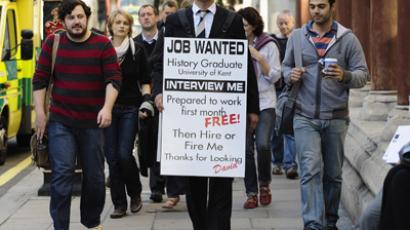‘Hitting the poorest’: UK-wide protests against ‘Bedroom Tax’
Thousands have protested in 57 cities across the UK against the 'Bedroom Tax.' Starting in April, more than 600,000 low-income Britons will either lose housing benefits or be forced to move out if their residence has a spare room.
According to the new law, tenants of working age who receive
housing support will lose 14 percent of their benefits if they have
one spare room, and 25 percent if they have more than one. Critics,
who dubbed the measure the 'Bedroom Tax,' have argued that the
definition of 'spare' is narrow and contentious.
“The government is saying they won’t have a tax on big
mansions, but they are having a bedroom tax on the poorest people
in the country,” MP Helen Goodman told RT.
Campaigners gathered across Britain to rail against the law,
which they say targets the most vulnerable.
"This is a cruel policy that primarily hits single parents, and the adult disabled,” Huffington Post reported, quoting the protest's national organizer, Eoin Clarke. “Even children deemed disabled but not 'severely' so, are affected. Carers, the terminally ill, battered wives and husbands are all affected.”

The 'Bedroom Tax' is expected to affect 660,000 people when it
is enacted next month.
RT spoke with Brian Ryder, who suffers from osteoporosis and
cannot work, and is one of thousands who will find themselves in a
Catch-22 next month. Under the new law, Ryder will lose £50 of his
housing benefits every month – money he needs for food and heating.
Otherwise, he would have to move out of the apartment where he has
been living for 14 years. He has asked to be provided with a
smaller apartment, but was told that none were available.
“People are being told they should move to a smaller flat,
but in my constituency there are fewer than 100 places people could
move to and that’s fairly typical across the country as a
whole,” Goodman said.
The government has argued the proposal is “an excellent policy which will lead to more efficient use of taxpayer-subsidized housing.”
















